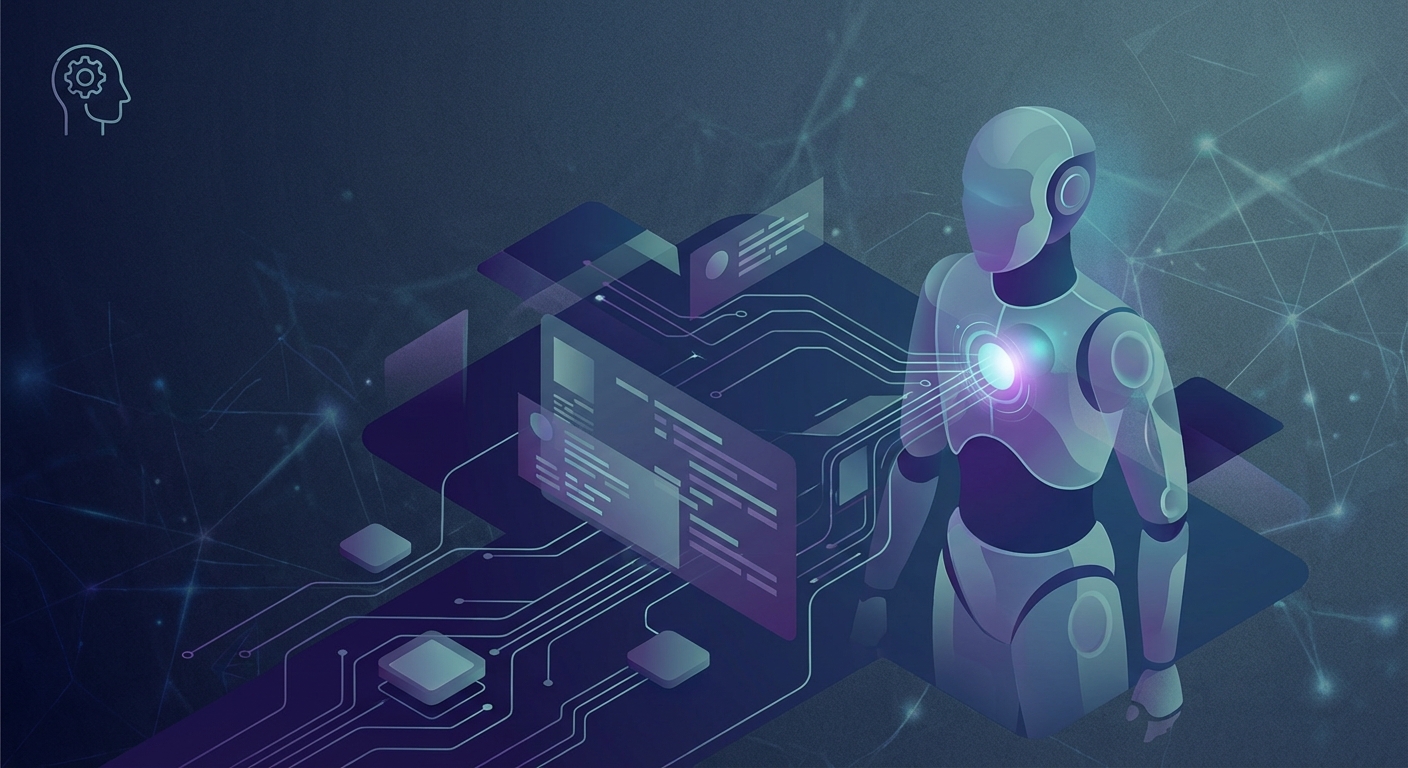Scaling AI Agents for Enterprise Success: Architecture, Governance, and Automation
TL;DR
- This article covers the critical aspects of scaling AI agents within enterprises, from aligning AI initiatives with business goals to establishing robust governance and security frameworks. It includes strategies for building scalable architectures, ensuring data readiness, developing cross-functional talent, and leveraging automation to drive tangible business impact, with a focus on practical implementation and real-world examples.
This article dives into how to make ai agents work for your business, covering everything from how you build them to how you keep them safe and running smoothly. We'll explore the essential architecture, the critical role of data and governance, the importance of having the right people, and how to put strong security in place. Plus, we'll look at some real examples of ai agents making a difference.
The Imperative of Scalable AI Agents in the Modern Enterprise
AI agents are totally going to change how businesses work. (How Vertical AI Agents Are Revolutionizing Enterprise Operations) But, like, how do you make sure these digital workers can actually handle all the work that's gonna come their way?
Here's why scalability is a must-have, not a nice-to-have:
- Increased efficiency: They can automate all those boring, repetitive tasks, which really frees up your human team to do more important stuff. Think about it, instead of someone manually entering data all day, an ai agent can do it in seconds, letting that person focus on, say, customer relations or strategy.
- Improved insights: These agents can dig through mountains of data – way more than any human could – and pull out useful patterns and recommendations. For example, an ai agent could analyze sales data across thousands of products and identify which ones are underperforming in specific regions, suggesting targeted marketing campaigns.
- Enhanced experiences: They can make things super personal for customers. Imagine an ai agent that remembers a customer's past purchases and preferences, then proactively suggests new items they might like, or even helps them navigate a complex service issue with tailored advice.
- Competitive edge: If you're using ai agents well, you'll be more innovative, your operations will run smoother, and you'll just be ahead of the game.
Gartner thinks that by 2028, about a third of enterprise software will have ai agents built into it. That's a huge jump from less than 1% in 2024. (Gartner Predicts Over 40% of Agentic AI Projects Will Be ...) Arya.ai also points out this big shift, saying ai agents will increasingly be making decisions on their own.
Scalability is really the key to getting the most out of ai agents. So, next up, we're gonna talk about the architecture you need to make all this growth happen.
Building a Scalable Architecture for AI Agents
AI agents are super promising, but how do you make sure they can keep up with a growing business? You really need a scalable architecture to handle all the extra work and complexity that comes with using ai everywhere.
Using cloud infrastructure is a big help because it gives you on-demand scalability. This means you can add or remove resources whenever you need them, so your ai agents can handle busy times and quiet times without a hitch. Plus, using things like Docker and Kubernetes for containerization makes sure your agents run the same way no matter where you deploy them.
- Example: A clothing store uses cloud-based ai agents to manage online orders. When it's a big sale season, the system automatically scales up to handle all the extra orders.
- Benefit: This means customers get their orders processed smoothly, and the business doesn't have to worry about the tech slowing down.
A microservices architecture also makes things more flexible. Each part of an ai agent works on its own, so you can update, scale, or fix one piece without messing up the whole system.
Next, we'll talk about getting your data pipelines set up so your ai agents always have the latest info.
Ensuring Data Readiness and Governance for AI Agent Scalability
To scale ai agents effectively, the data they use has to be top-notch and well-managed. Are you ready to put in the effort to get your data in shape?
Here’s how to make sure your data is ready for ai agent growth:
- Data Readiness: You need to clean up and combine data from all your different systems. This also means filling in any blanks or missing pieces. Remember, bad data is a major reason why ai projects don't work out. (Why Most AI Projects Fail: 10 Mistakes to Avoid | PMI Blog)
- Data Governance: Figure out who's in charge of what data, make sure everyone uses the same definitions, and keep track of where the data comes from and how it's changed. Think of your data as a valuable asset, not just something you have lying around.
- Data Ethics: Set up rules for using ai responsibly. This includes checking for fairness and bias. You also need to protect people's privacy and follow rules like GDPR and HIPAA.
For instance, a bank could have specific teams responsible for making sure customer data is consistent across all its departments. They could also use ai models to spot and flag any unfair bias in loan applications.
Now that your data is ready and you're thinking about ethics, the next step is to get your AI governance and security frameworks solid.
Developing Cross-Functional Talent and AI Fluency
Scaling ai agents isn't just about the tech; it's also about investing in your people. You need a team that understands ai to really get the most out of these smart systems.
First, put together a diverse ai task force. This group should have data scientists, machine learning engineers, and software developers. But don't forget the people who actually know your business inside and out – domain experts. Their input is super important to make sure the ai agents actually help with what you're trying to do.
- For example, if you're doing ai in healthcare, you need both tech wizards and experienced nurses to make sure diagnoses are accurate. (Yoon, Kim, & Lee (2023)) shows how important ai is in patient care.
It's also really important to manage how your employees adapt to ai. Offer training sessions and workshops. These should teach people how to use ai tools and understand what they're telling you.
Leaders need to encourage trying out new ai ideas. Host hackathons and innovation labs to spark creativity. And if people are worried about their jobs, make it clear that ai agents are there to help them, not replace them.
With a team that's skilled and on board, your company can really unlock the power of ai agents. Next, we'll talk about setting up strong ai governance and security to make sure everything is used responsibly.
Establishing Strong AI Governance and Security Frameworks
AI agents can do amazing things, but if you're not careful, they can also cause big problems. Having good governance and security is key for using ai the right way.
A solid ai governance plan gives you a clear structure and oversight as you use more ai.
- Set rules for how ai agents are built, tested, used, and watched.
- Decide on specific goals or accuracy levels agents need to hit before you use them.
- Make sure humans review important decisions or ones that are regulated.
Using ai in places like banking, healthcare, and government services means you're under a lot of scrutiny from regulators.
- Look into the laws that apply before you start using ai, especially concerning fairness, how it works, and who's responsible.
- Keep detailed records of what the ai agents decide and do so you can track things and be transparent.
- Use tools and methods to find bias in the data you train on and in what the models predict.
When ai agents get access to sensitive data and can make decisions, they become a big target for cyberattacks.
- Enforce strict permissions based on roles, so agents can only access the data they absolutely need.
- Protect data, whether it's stored or being sent, with strong encryption.
- Regularly test your models and apis for attacks, data leaks, or unauthorized access.
With good governance and security in place, businesses can feel confident scaling up their ai projects. Now, let's look at some real-world examples of how scalable ai agents are making a difference.
Real-World Examples of Scalable AI Agents and Their Impact
Did you know ai agents are already changing how businesses work in all sorts of industries? These smart systems are moving beyond just testing and becoming a core part of how companies operate.
Here’s how scalable ai agents are making an impact:
- Enhanced Customer Service: Ai agents give personalized help, making customers happier. For example, an ai chatbot can instantly access a customer's order history and previous support interactions to provide context-aware solutions, rather than asking repetitive questions.
- Optimized Processes: By automating tough tasks, ai agents cut down on mistakes and make things run better. Think about an ai agent that can automatically process insurance claims by verifying documents, cross-referencing policy details, and flagging any discrepancies, saving hours of manual work and speeding up payouts.
- Data-Driven Decisions: Ai agents offer insights right when you need them, helping you make smarter business choices. For instance, an ai agent monitoring supply chain data could detect a potential disruption in a key component's delivery route in real-time and alert management, allowing them to quickly reroute or find an alternative supplier, thus preventing production delays.
As ai keeps getting better, scalable ai agents will be super important.
Conclusion: Embracing the Future with Scalable AI Agents
We've covered a lot, from building the right architecture and making sure your data is ready, to getting your team up to speed and keeping everything secure. The message is clear: scalable ai agents aren't just a trend; they're becoming essential for businesses that want to stay competitive and efficient. By focusing on these key areas, you can confidently harness the power of ai to drive innovation and achieve your business goals. The future is here, and it's powered by intelligent, scalable agents.





